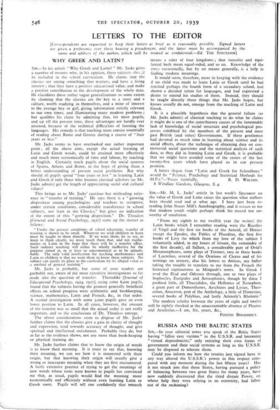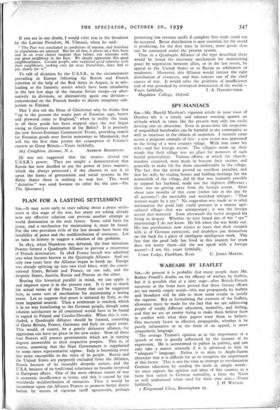RUSSIA AND THE BALTIC STATES Sta,—In your editorial notes you
speak of the Baltic States having "fallen easy victims" to the U.S.S.R. and becoming "virtual dependencies," only enjoying their own forms of government and their social systems as long as the U.S.S.R. may be disposed to tolerate them.
Could you inform me how the treaties just signed have in any way altered the U.S.S.R.'s power in this respect com- pared with any moment during the last fifteen years? Has it not -struck you that these States, having pursued a policy of balancing between two great States for many years, have now suddenly discovered that the third distant Power, on whose help they were relying in an extremity, had fallen out of the reckoning?
If you are in any doubt, I would refer you to the broadcast by the Latvian President, M. Ulmanis, when he said: "The Pact was concluded in conditions of tension, and therefore its stipulations are unusual_ But for all that, it places on a firm basis and in an even clearer manner than before, our relations with our great neighbour in the East. We deeply appreciate this good neighbourliness. Certain people, who neglected good relations with their neighbours, seeking only far away friendships, have had to pay dearly for it."
To talk of dictation by the U.S.S.R., in the circumstances prevailing in Europe following the British and French rejection of the help of the Red Army in August, is as mis- leading as the fantastic stories which have been circulating in the last few days of the 700,000 Soviet troops—or alter- natively zo divisions, or alternatively again one division— concentrated on the Finnish border to dictate imaginary sub- jection to Finland.
May I also ask the Dean of Chichester why he thinks that "up to the present the major part of Estonian eggs, butter and plywood come to England," when in reality the trade in all these goods has been stopped since the war began owing to German domination of the Baltic? It is precisely the new Soviet-Estonian Commercial Tr;.aty, providing transit for Estonian goods over Soviet waterways to Murmansk, that will for the first time permit the resumption of Estonia's exports to Great Britain.—Yours faithfully,
[It was not suggested that the treaties altered the U.S.S.R.'s power. They are simply a demonstration that Russia has now decided to use the power of force majeure, which she always possessed ; if she chooses to use it to upset the forms of government and social systems in the Baltic States there is nothing to stop her. The word "dictation" was used because no other fits the case.—En. The Spectator.]













































 Previous page
Previous page